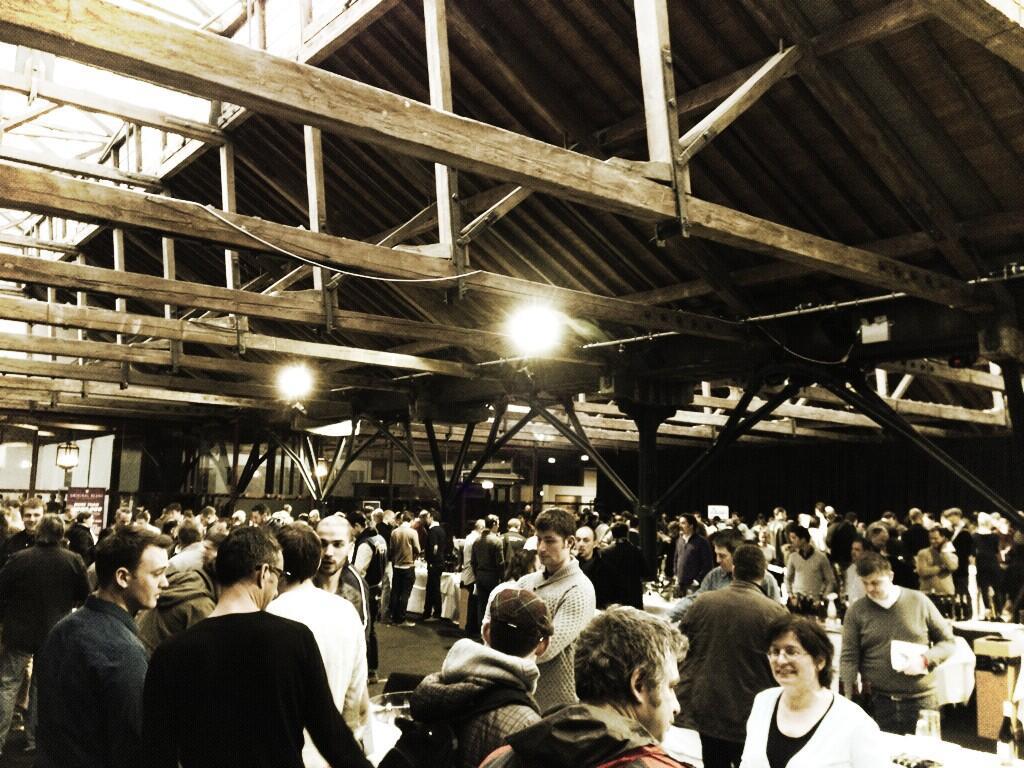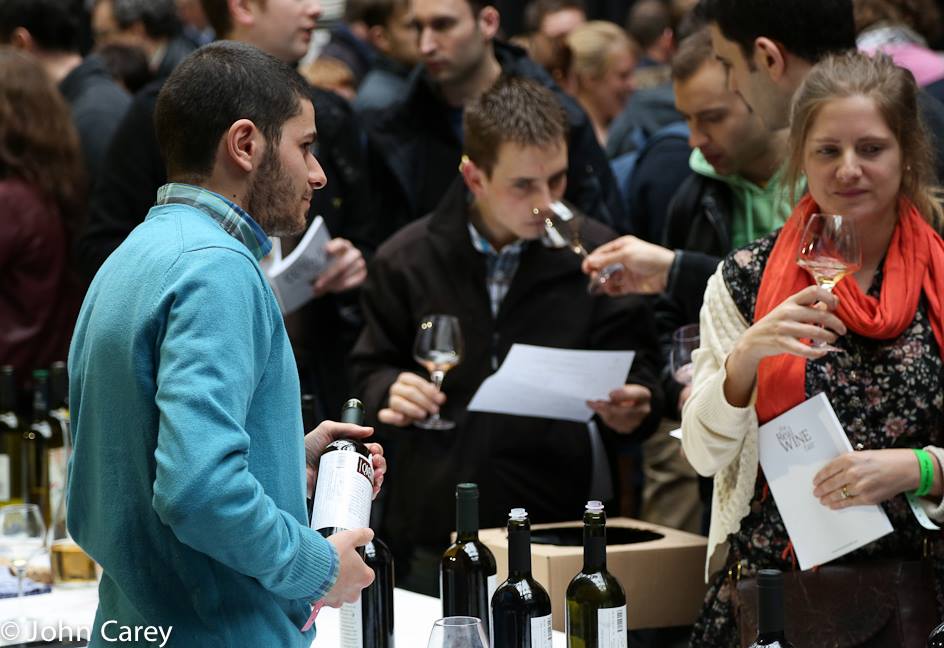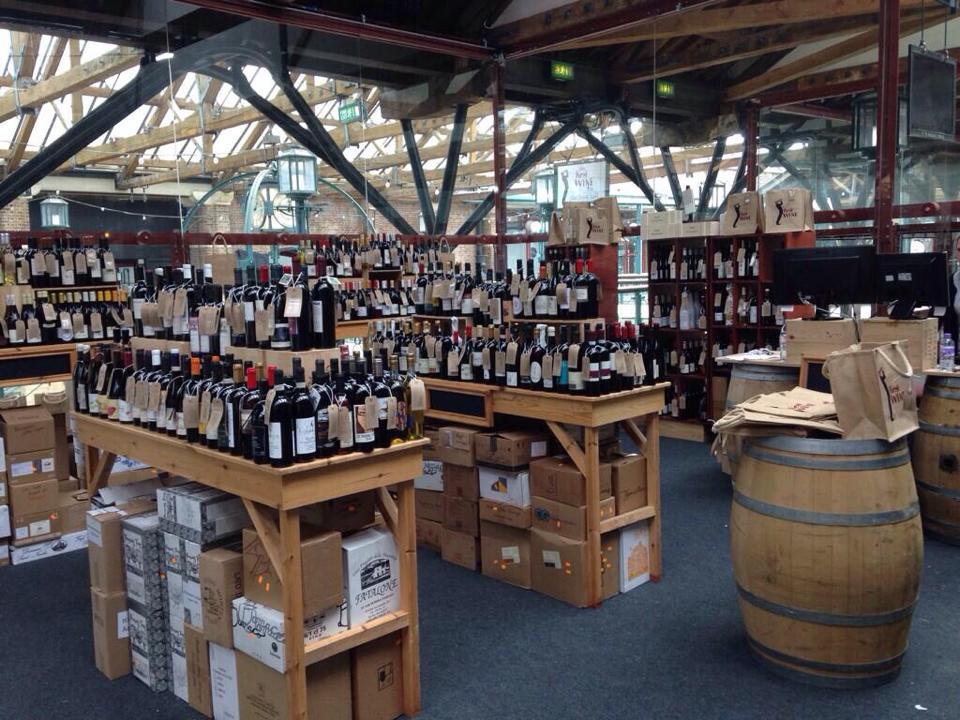It’s nice to abandon logic (to be an uncritic, as it were) and the habit of mind that would “murder to dissect” (to quote Wordsworth) wine and to go with one’s tastes and with what one feels. So many of our responses are mediated through the thick gauze of criticism that we neglect the hedonic, sensuous appeal of the wines in favour of brute diagnostics.

I am going on what I tasted at The Real Wine Fair and indeed my experience of having thousands of naturally-made wines over the last few years. I have to say that I did not encounter more than a handful of vinegary, sour wines (same thing?) out of the 300-400 wines I tried, most of which passed my ultimate taste test – which is not how good they might claim to be on some arbitrary objective scale, but whether I would take them home and drink them with friends.
Conversely, for those whose palates are attuned thus, then “apple flavours” in a few natural wines are necessarily pear-shaped and = aldehydes, whilst gamey aromas denote, by definition, the incursion of brett. It ain’t necessarily so. There are faults and faults; it is wise not to be absolutist in these matters and indulge in a tyranny of fault-finding wherein anything that deviates from the designated cleanliness/godliness norm must naturally trigger a disparaging response.
It is also perhaps unwise to describe– and damn- any and all wines at a wine tasting as unpleasant (because you “believe” it must be so) so as to create an ideological platform from which to attack low/non-intervention wines – when you are in absentia. It is not just absence that makes the mind grow more cynical; we have to ask ourselves whether this is a fair summary or even an approximate depiction of the truth, or simply an opinion cultivated by some critics pleased to flaunt a professional contrarianism. It is the argument used by people who have philosophical difficulty with the mere concept that good wines might be successfully made in such a fashion – resulting in a critical approach that is akin playing the man rather than the ball. As Keats wrote aphoristically in a letter to his friend John Hamilton Reynolds, “axioms in philosophy are not axioms until they are proved upon our pulses.” Opinions, even when they are couched as if they are statements of unvarnished truth, are still opinions, for all that. In the real wine world of drinking and enjoyment these axioms are indeed proved upon our pulses.
One bad apple may ruin a barrel but a few bad wines in any case will not diminish the general qualitative thrust of an artisan wine tasting. To some natural wine may be one step away from vinegar, but a closed mind is sweet reason turned to vinegar. Criticism, as an end in itself, unless it is written with sense of proportion and humility, is the tail that wags the dogma. And the dog in the dogma is doggedly defending the status quo.

After all if one conducted a straw poll (rather than use straw man arguments) of the visitors who went to Real Wine Fair I suspect that would probably find that the majority of visitors liked most of the wines on show. Which may be as much to say that if you like that sort of thing then that is the sort of thing you like. The proof of this pudding is certainly in the drinking – that so many fair-goers went to the Real Wine Shop afterwards and purchased several bottles of wines speaks volumes for the perception of quality. One doesn’t need a popular growers’ fair to prove this point. Just look at the number of successful natural wine bars, cavistes and wine importers. Look at the conspicuous success of The Real Wine Month Promotion which ran in over 250 restaurants and retailers throughout the British Isles. Look at the way that the wines have been incorporated into hundreds of wine lists. No fanfare nor breast-beating required. Hundreds and thousands of people happily drink intervention-free wine every day and not just because they have been sold an advertising pup by my Jedi mind-control tricks. If they like the wine they will pay their hard-earned for it and drink it and if they don’t, they won’t! As simple as that. We are not such exanimate beings as to be seduced by the power of the trend. The beauty of natural wine is that its drinkers will have a discriminating relationship with each individual wine rather than be brainwashed into liking them all by believing in the concept behind them. The wines thus exist on merit, rather than hype, although people may be alerted to their presence ironically by the very critics who would damn them with faint damns and thereby the kind of publicity the growers could only dream of acquiring.

For this is a matter of diversity. The Real Wine Fair deserves a proper spectrum analysis. Different growers, young and old, from different regions and cultural traditions, some who have been to oenology colleges and are schooled in the science of wine, others who have worked in the vines since they were children, all using different methods and different experiences, approaching the wine in a unique fashion using their individual sense of taste, their knowledge and their experience. They know what they want; fundamentally, the wine must be pleasing to them. The vignerons are doers and achievers – they make a product by the sweat of their brow and the work of the plough and it is important to respect the effort that goes into the wine and the intentions that underpin the whole process.

I was on a magazine panel tasting a few years ago. There were six of us, all independent-minded individuals. Three of us wanted to award a particular wine a gold medal and the other three thought it was faulty and should be disqualified from consideration. In the end the marks of the sceptics prevailed. This vignette illustrates that even when all things are equal it is easier to find fault than to praise unorthodoxy.
“Consider the matter dispassionately, Mr Foster, and you will see that no offence is so heinous as unorthodoxy of behaviour. Murder kills only the individual– and after all, what is an individual? “. . . .” We can make a new one with the greatest of ease– as many as we like. Unorthodoxy threatens more than the life of a mere individual; it strikes at Society itself.” –Aldous Huxley, Brave New World
The nature of faults is most interesting in how it relates to a human need for recognisable structures and limitations within their lives. Human beings themselves are flawed, physically and mentally, their complex neural networks making them behave in a unique and individuated fashion, yet we insist on a degree of faultlessness in living products (such as wine) that is truly unnatural. You can condition and regulate behaviour with drugs and other chemical interventions and so you can mould and cleanse wines by stripping out the quirks and odd flavours. Real wines have flaws like the very people who made them, like nature itself. And some wines test our taste experience to the very limits.
“He’d pull me back into the center, and I want to stay as close to the edge as I can without going over. Out on the edge you see all kinds of things you can’t see from the center.” He nodded, “Big, undreamed-of things — the people on the edge see them first.” –Kurt Vonnegut, Player Piano
These limits manifest themselves as the occasional by-products of natural wine-making such as cloudiness, VA, reduction and secondary fermentation. The received wisdom is that these are faults, impure and simple, whereas they are often, in fact, the by-product of a certain style of winemaking. Some of these by-products enhance the final wine and some detract from it. Those who determine what is correct or otherwise are capable of arbitrary distinctions themselves. Famously, some of the most acclaimed wines ever made (Cheval Blanc 47 or Chateau Fireback from the same vintage) shared many of the so-called faults described above and there were great wines before the introduction of technology, wines which – by current standards – would be considered unfit for purpose.
“To Lurton, the ’47 Cheval is miracle juice; it is a wine that should have been destroyed by its defects but that somehow blossomed into an ageless, ethereal wonder. “All the faults became qualities; all of these excesses went into the service of an exceptional wine,” is how he put it to me. To the extent that the château staff contributed to this improbable success, Lurton said, it was in recognizing that the elements were going to have their way with the wine and being courageous enough to stand aside and let it happen.” –Mike Steinberger, The Greatest Wine on the Planet
The freedom to get it wrong is the freedom also to make something extraordinary. Go figure.
And so the aspiration towards scientific perfectionism often results in kind of warm nullity. Meanwhile, the sheer act of flawed human endeavour can wring something out of nothing and will it into a rough existence. By reducing wine to an abstract science, a merely definable sequence of chemical and microbiological processes rolled out on some production line, one robs it of one of its many singular purposes, which is to summon individual aesthetic responses. Invoke, evoke, provoke.

“It would be possible to describe everything scientifically, but it would make no sense; it would be without meaning, as if you described a Beethoven symphony as a variation of wave pressure.” –Albert Einstein
We should not elevate real wines to the level of a work of fine art; nor should we reduce them to the level of simple artifice, but rather celebrate them as an ineffable mixture of artlessness and artisanship. Those who nurture their vines and their wines most sensitively tend to get the most out of them; those who drive nature out with modern-day pitchforks and chemicals achieve a stable product qua product. To express a preference for the former is not to invalidate the latter; this is not a discussion about commercial imperatives or the commoditisation of wine, but a desire to drink authentic wines.
The return to traditional methods of low-impact farming and the renaissance of low-intervention natural winemaking methods have created a new thirsty market for the resultant delicious, tasty and unpretentious wines. Some vignerons will always push the envelope in their endeavours to arrive at some kind of vinicultural truth. These explorers may get it right or they may get it wrong. When the results are good they are wonderful, for they are thrillingly original and thought-provoking and the wines have a kind of fearless asymmetry; and, when they are clumsy, they invite opprobrium from on high. Whatever, the search of taste in wine is a continual adventure and we will continue to support the risk-takers, the less-is-more brigade, the terroir-istes and those whose philosophy is to accompany the wine during its transformation rather than superimpose style over substance with the use chemical techniques and multifarious interventions.

